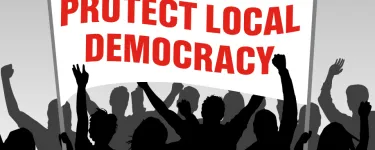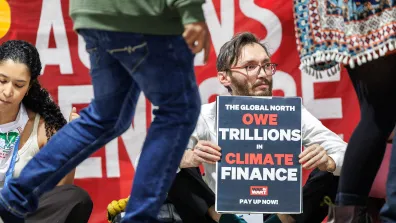Protect local democracy

UPDATE: In May/June 2017, War on Want supported a Judicial Review challenging the block on local council divestment, and WE WON! What a fantastic victory for local democracy and the BDS movement, but we'll have to remain vigilant to make sure our success isn't rolled back.
In November 2015, the government announced a proposal to block local councils in England and Wales from deciding how to invest their pension funds. On 1 November 2016 it came into force. This is the latest in a sustained government assault on democratic rights and freedoms following the Lobbying Act, Trade Union Bill, Prevent and much else.
Under the new policy, the government has the power to veto investment decisions made locally on ethical grounds in relation to human rights, arms trade, fossil fuels and other issues of concern.
The policy is a grave threat to the fight for human rights.
The Conservative Party press release announcing the plan named it as a response to the "spread of militant divestment campaigns against UK defence and Israeli firms."
The policy is an explicit attempt to clamp down on the growing strength of the grassroots Boycott, Divestment and Sanctions (BDS) movement which aims to end government and corporate complicity in Israel’s violations of Palestinian rights.
The new regulation is written in very opaque and technical language. This Q&A will help decode it:
1. How has the Local Government Pension Scheme investment worked until now?
The Local Government Pension Scheme has 4.6 million members across the UK such as teachers, librarians, social workers and other employees in local government jobs. It has been a decentralised scheme with decisions made locally about how pensions are invested.
Until now, local residents could call on their local pension fund to divest from a company whose practices they regard as unethical. Local pension scheme members would then consulted on the issue and, if they agreed, the fund administrators would then authorise the divestment. This process gave all the stakeholders a say, and it allowed for public debate and discussion resulting in practical changes that keep local government representative of the values of the local community. It’s called democracy!
2. What is the change that is being implemented through the new policy?
Under the new plan, the Secretary of State for Communities and Local Government will have ‘power of intervention’, meaning s/he can override decisions made democratically by the local council. This means that the government can interrupt the democratic process and cut out the voices and decisions of the pension scheme members and their communities.
3. When will these changes take place?
While the original proposal came out in November 2015, the guidance indicating that the plan is going ahead was only released in September 2016, and the regulations themselves came into force on 1 November 2016.
4. I thought the government was in favour of localism and devolving power to local councils?
So much for George Osborne’s so-called ‘Devolution Revolution’. The government claims the new regulation gives more power to local authorities. This is nonsense. Under the new plan, central government has a veto over decisions made locally. This is unfair and anti-democratic and simply highlights the dishonesty at the heart of the government’s plan.
5. Is this a full ban on divestment?
Not quite, but it’s pretty close. The regulations so far are set out in the form of guidance issued by the Secretary of State for Communities and Local Government in September 2016 (the official regulation is expected in the coming months). The guidance sets out how local government investment plans should comply with the government’s position: “The Government has made clear that using pension policies to pursue boycotts, divestment and sanctions against foreign nations and UK defence industries are inappropriate, other than where formal legal sanctions, embargoes and restrictions have been put in place by the Government.”
While the government has not used the language of a 'ban' in the guidance, this line is included to deter local councils from taking divestment action. However, where this intimidation fails, central government will still have the final say through the ‘power of intervention’ (see question 2).
6. Will divestment increase my council tax?
No. This is a dangerous red herring that the government has slipped into the proposal. It is simply scaremongering. When this was still in its proposal form, then-Secretary of State for Communities and Local Government Greg Clark, said: “Divisive policies undermine good community relations, and harm the economic security of families by pushing up council tax.” There is no evidence to support his claim, and no evidence of any link between divestment and higher council tax.
7. Didn’t Thatcher do something similar in the 1980s?
She did. Margaret Thatcher was similarly unnerved by the strength of the movement in solidarity with the South African anti-Apartheid struggle. Local authority divestment campaigns were a major part of that movement, and by 1988 campaigners were well organised, successfully getting local councils to divest from companies supporting Apartheid. The Thatcher government tried to clamp down on the democratic space, but ultimately failed to hold back this powerful movement for justice.
8. Is this proposal a serious attack on BDS?
Yes, and it follows moves by private groups in the UK increasingly using intimidating tactics to prevent people from taking action for justice in Palestine. For example, one private group challenged three local councils (Leicester, Swansea and Gwynedd) with a Judicial Review over BDS resolutions they had passed. Their court challenge against council BDS motions failed and two High Court judges affirmed that these councils' BDS motions were not unlawful, but this new plan is designed to intimidate councils out of taking divestment action in the future.
9. Why is the government doing this now?
This proposal comes at a time when the BDS and anti-arms movement is having unprecedented success. More people than ever are taking action in their universities, churches, trade unions and local communities to end their complicity with the arms trade and human rights abuses.
In 2016, the American United Methodist Church declared the five largest Israeli banks off-limits for investment, French telecom giant Orange terminated its Israeli contracts, and Irish multinational CRH divested its share from the Israeli company supplying concrete for the Apartheid Wall. All of these victories are the result of hard-fought public campaigns.
10. Is this the same as the 'boycott ban' that made headlines on 14 February 2016?
It's a part of the same overall plan, but technically different processes and rules. This plan deals with how local authorities invest their members' pensions. The so-called 'boycott ban' covers all public authorities and deals with their procurement policies, or in other words, which companies get public authority contracts.
It's important to note, the new procurement guidance, now known popularly as the ‘boycott ban’, is a disturbing attempt to thwart BDS efforts by using scary language, but it does not ban boycotts.
11. How can I fight back against this attack on local democracy?
Our campaign to protect local democracy is already underway, led by an incredible coalition of groups active on a broad range of issues. In less than one month, over 23,000 people submitted responses to an official government consultation on the new proposal, saying no to this attack. That amounts to around 98% of the respondents rejecting the plan. But despite this public outcry, the government is ploughing ahead with the plan, showing its disregard for democracy.


